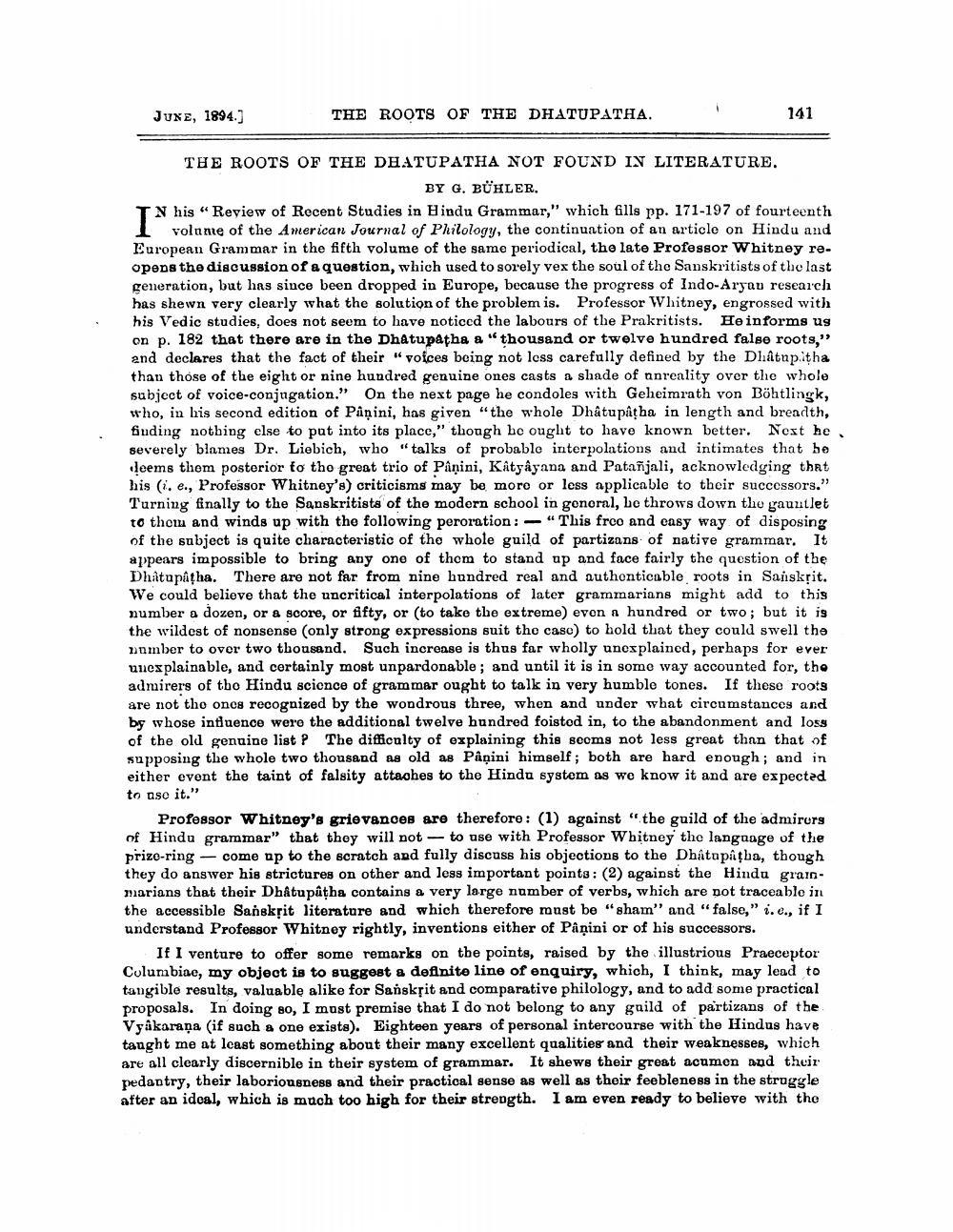________________
JUNE, 1894.]
THE ROOTS OF THE DHATUPATHA.
141
THE ROOTS OF THE DHATUPATHA NOT FOUND IN LITERATURE.
BY G. BÜHLER.
IN
N his "Review of Recent Studies in Hindu Grammar," which fills pp. 171-197 of fourteenth volume of the American Journal of Philology, the continuation of an article on Hindu and European Grammar in the fifth volume of the same periodical, the late Professor Whitney reopens the discussion of a question, which used to sorely vex the soul of the Sanskritists of the last generation, but has since been dropped in Europe, because the progress of Indo-Aryan research has shewn very clearly what the solution of the problem is. Professor Whitney, engrossed with his Vedic studies, does not seem to have noticed the labours of the Prakritists. He informs us on p. 182 that there are in the Dhatupatha a "thousand or twelve hundred false roots," and declares that the fact of their "voices being not less carefully defined by the Dhâtupitha than those of the eight or nine hundred genuine ones casts a shade of unreality over the whole subject of voice-conjugation." On the next page he condoles with Geheimrath von Böhtlingk, who, in his second edition of Pânini, has given "the whole Dhâtupâtha in length and breadth, finding nothing else to put into its place," though he ought to have known better. Next he severely blames Dr. Liebich, who "talks of probable interpolations and intimates that be deems them posterior to the great trio of Pânini, Kâtyâyana and Patanjali, acknowledging that his (i. e., Professor Whitney's) criticisms may be more or less applicable to their successors." Turning finally to the Sanskritists of the modern school in general, he throws down the gauntlet to them and winds up with the following peroration:-"This free and easy way of disposing of the subject is quite characteristic of the whole guild of partizans of native grammar. It appears impossible to bring any one of them to stand up and face fairly the question of the Dhatupatha. There are not far from nine hundred real and authenticable roots in Sanskrit. We could believe that the uncritical interpolations of later grammarians might add to this number a dozen, or a score, or fifty, or (to take the extreme) even a hundred or two; but it is the wildest of nonsense (only strong expressions suit the case) to hold that they could swell the number to over two thousand. Such increase is thus far wholly unexplained, perhaps for ever unexplainable, and certainly most unpardonable; and until it is in some way accounted for, the admirers of the Hindu science of grammar ought to talk in very humble tones. If these roots are not the ones recognized by the wondrous three, when and under what circumstances and by whose influence were the additional twelve hundred foisted in, to the abandonment and loss of the old genuine list? The difficulty of explaining this seems not less great than that of supposing the whole two thousand as old as Pânini himself; both are hard enough; and in either event the taint of falsity attaches to the Hindu system as we know it and are expected to use it."
Professor Whitney's grievances are therefore: (1) against "the guild of the admirers of Hindu grammar" that they will not to use with Professor Whitney the language of the prize-ring come up to the scratch and fully discuss his objections to the Dhâtupâtha, though they do answer his strictures on other and less important points: (2) against the Hindu grammarians that their Dhâtupâțha contains a very large number of verbs, which are not traceable in the accessible Sanskrit literature and which therefore must be "sham" and "false," i. e., if I understand Professor Whitney rightly, inventions either of Pânini or of his successors.
If I venture to offer some remarks on the points, raised by the illustrious Praeceptor Columbiae, my object is to suggest a definite line of enquiry, which, I think, may lead to tangible results, valuable alike for Sanskrit and comparative philology, and to add some practical proposals. In doing so, I must premise that I do not belong to any guild of partizans of the Vyakarana (if such a one exists). Eighteen years of personal intercourse with the Hindus have taught me at least something about their many excellent qualities and their weaknesses, which are all clearly discernible in their system of grammar. It shews their great acumen and their pedantry, their laboriousness and their practical sense as well as their feebleness in the struggle after an ideal, which is much too high for their strength. I am even ready to believe with the




